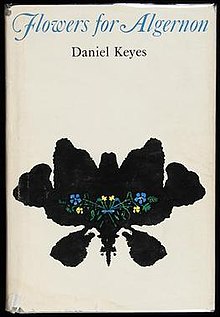 Dust jacket of the novel’s first edition | |
| Author | Daniel Keyes |
|---|---|
| Language | English |
| Genre | Science fiction |
| Publisher | Harcourt, Brace & World |
Publication date | April 1959 (short story) March 1966 (novel) |
| Publication place | United States |
| Media type | Print (hardback & paperback) |
| Pages | 311 (novel)[1] |
| ISBN | 0-15-131510-8 |
| OCLC | 232370 |
Flowers for Algernon is a short story by American author Daniel Keyes, later expanded by him into a novel and subsequently adapted for film and other media. The short story, written in 1958 and first published in the April 1959 issue of The Magazine of Fantasy & Science Fiction, won the Hugo Award for Best Short Story in 1960.[2] The novel was published in 1966 and was joint winner of that year's Nebula Award for Best Novel (with Babel-17).[3]
Algernon is a laboratory mouse who has undergone surgery to increase his intelligence. The story is told by a series of progress reports written by Charlie Gordon, the first human subject for the surgery, and it touches on ethical and moral themes such as the treatment of the mentally disabled.[4]
Although the book[5] has often been challenged for removal from libraries in the United States and Canada, sometimes successfully, it is frequently taught in schools around the world and has been adapted many times for television, theater, radio and as the Academy Award-winning film Charly.[6][7][8][9]
- ^ Daniel Keyes (1966). Flowers for Algernon (1st ed.). New York: Harcourt, Brace & World. OCLC 232370.
- ^ Cite error: The named reference
Hugowas invoked but never defined (see the help page). - ^ Cite error: The named reference
Nebulawas invoked but never defined (see the help page). - ^ Emily Langer (June 18, 2014). "Daniel Keyes, author of the classic book 'Flowers for Algernon,' dies at 86". The Washington Post.
- ^ Daniel Keyes (2004) [1966]. Flowers for Algernon. Orlando: Harcourt. ISBN 9780156030304. OCLC 0156030306.
- ^ Cite error: The named reference
ALA100was invoked but never defined (see the help page). - ^ Kyle Munley (October 3, 2008). "Challenged and Banned: Flowers for Algernon". Suvudu. Archived from the original on July 30, 2016. Retrieved June 25, 2015.
- ^ Cite error: The named reference
dkafaqwas invoked but never defined (see the help page). - ^ Birdsall, Peter (1978). Mind War: Book Censorship in English Canada. CANLIT. p. 37. ISBN 0-920566-01-4.